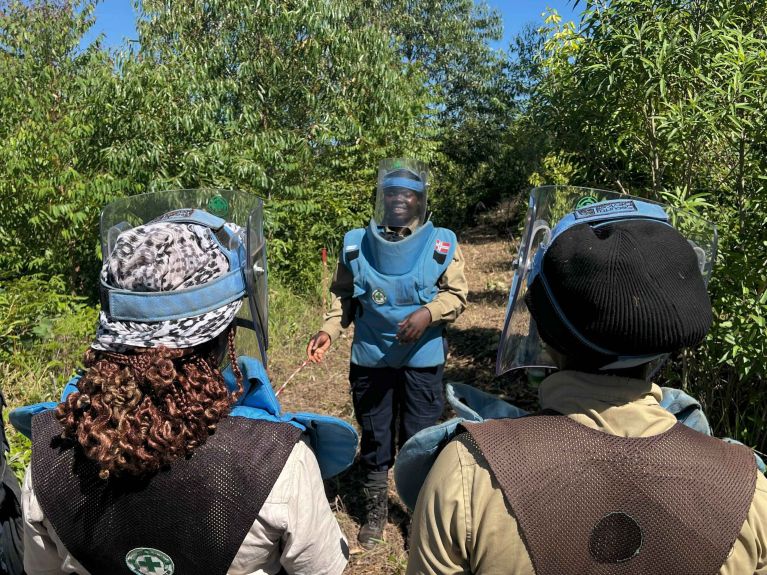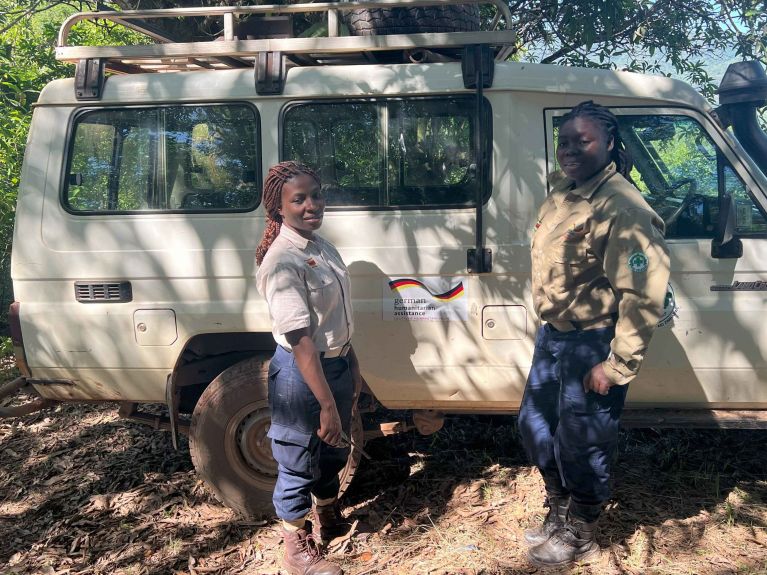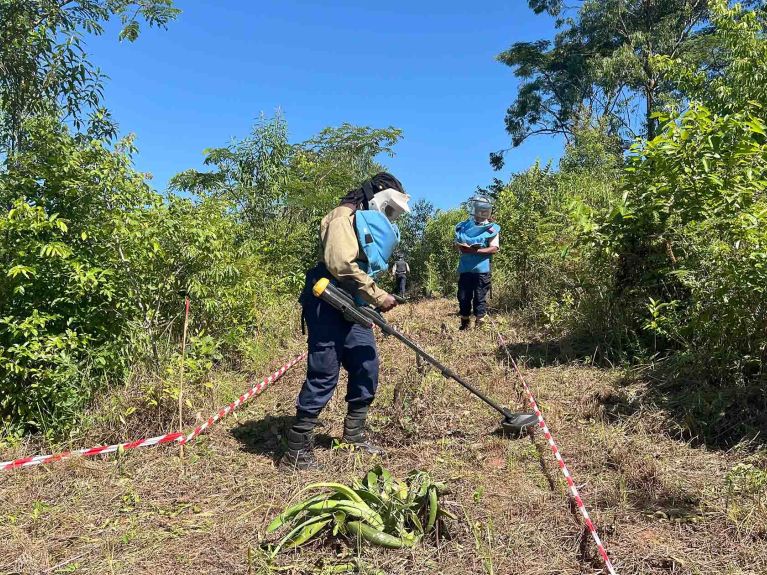Fighting for a mine-free Zimbabwe
Rosemary Chigariro has a dangerous job as a deminer. But her work helps the people of Zimbabwe feel safer.

A typical working day for Rosemary Chigariro begins with meticulous preparation. Intensely focussed, the 31-year-old finds out about the plot of land she is about to walk on: what is the soil like, what risks and hazards are there, how exactly will she and her team proceed, how will they communicate with each other? Next, Chigariro puts on her work clothes – visor, ballistic waistcoat, gloves, knee-high boots – and picks up her equipment: a metal detector, defusing tools, communication equipment, first aid material. She and her colleagues then make their way to the site. From now on, she remains focussed for several hours – and she is extremely careful. She makes painstaking use of her detector to examine the ground, yard by yard.
For eleven years now, Rosemary Chigariro has been working as a deminer for the organisation Norwegian People’s Aid (NPA) in her home country of Zimbabwe. NPA also receives support from Germany for its activities. The work done by Chigariro and her colleagues is exhausting: it requires enormous patience and a lot of discipline. Her equipment alone weighs at least ten kilograms. And mine clearance is a dangerous activity – a landmine could explode at any time. But Chigariro is aware how important her job is for the country and for the people of Zimbabwe.
The enormous hazard posed by minefields
To this day, the catastrophic remains of Zimbabwe’s war of independence in the 1970s are still to be found along the border with Mozambique. According to the World Without Mines foundation, the area is home to one of the densest mine belts in the world. The minefields were often laid directly alongside houses, schools, and hospitals and across agricultural land: a path to a well or to the nearest hospital or school is dangerous, fertile land cannot be cultivated, children risk their lives when they go out to play.

Germany’s active engagement for a world without mines
Germany is dedicated to achieving the common goal of a mine-free world in Zimbabwe and many other countries. In April 2024, the Foreign Office published its new strategy (2024 to 2028) for humanitarian mine and ordnance clearance. Germany is actively involved in setting the international agenda in this area. In 2023 the Federal Foreign Office supported national and regional projects in 15 countries as well as a number of global projects, focusing on capacity-building, advising national agencies, developing strategies and promoting international standard-setting. Having provided 70 million euros in funding, Germany was the second largest bilateral donor for humanitarian mine and ordnance clearance worldwide in 2023, as in previous years, and also chaired theOttawa Convention in 2023.
Ottawa Convention: mine-free Zimbabwe by 2025
Zimbabwe and 163 other countries are to be mine-free by 2025 – this is the aim of the Ottawa Convention, an international treaty signed by 164 countries which aims to ban anti-personnel mines. In Zimbabwe, four international non-governmental organisations are involved in the Mine Action Programme run by the Zimbabwe Mine Action Centre (ZIMAC). One of these NGOs is NPA – the organisation that Rosemary Chigariro works for. NPA has been clearing mines in Zimbabwe since 2012. According to the Mine Action Review, more than 31,000 mines were destroyed in Zimbabwe in 2022 thanks to the efforts of Rosemary and the other deminers.

“We get a lot of praise from the people who live near where we work,” says Rosemary, who leads a team of ten people at NPA. “Once the cleared areas have been approved, they live in freedom again – they can cultivate their fields, so they have food and an income.” The highly dangerous nature of her job did not stop her from applying to NPA in 2013. “I was living off odd jobs at the time and saw an advert on a poster saying that NPA was looking for people who wanted to train as deminers,” she recalls. She applied for the position, was invited to interviews and passed several fitness tests. “I was one of the best and I was accepted straight away,” she says proudly. After subsequent training, she was a member of the first clearance team deployed in the Burma Valley on the border between Zimbabwe and Mozambique. “I wasn’t just the first woman, I was also the youngest on the team,” she recalls.
New perspectives after demining
After the clearance of the minefield in the valley was completed in 2015, the Ministry of Agriculture distributed three hectares of cleared land among farmers and provided financial support for them to assist them with their work. Today, children in the cleared area can go to school safely, patients and their families can go to the nearest hospital without any risk, and a community well that was previously located in a minefield is now safe to use.
Examples such as that of Burma Valley demonstrate the huge impact that the work done by Chigariro and her colleagues has on people’s lives: apart from making their lives safer, it contributes to reducing poverty, increasing food security and ensuring they enjoy improved access to health and educational services.
In addition to mine clearance, Rosemary’s employer NPA also supports the Zimbabwe Mine Action Centre in developing a comprehensive risk management strategy for dealing with residual contamination from mines and setting up a reporting centre to handle risk cases. This work is part of a project funded by Germany’s Federal Foreign Office.
Whenever she sets off for three weeks on a demining mission to the border with Mozambique, Rosemary travels 300 kilometres away from her husband and two sons. “At first my family was worried that something might happen to me. But my husband has worked as a deminer himself so he’s well aware of the dangers.” Rosemary takes a pragmatic view of the risks her work involves: “If you follow all the rules, there isn’t really anything that can go wrong.” Nevertheless, it’s not just a job like any other, she says. “Our work has a vital impact for Zimbabwe and its people. That makes me feel really good about what I do.”


